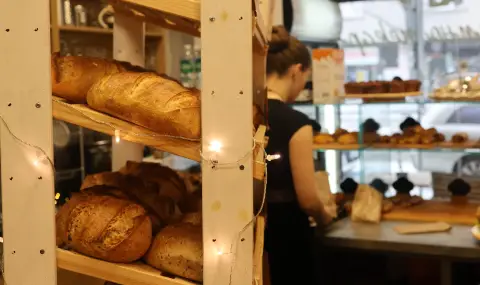Comment by Emilia Milcheva:
If the populism of politicians were daily bread, citizens would be full and satisfied. But in reality, populism feeds politicians, while Bulgarians pay for increasingly expensive bread.
The zero VAT rate for bread and flour, introduced in mid-2022 with a budget update, was beneficial only to business. They were proposed by the BSP and "There is such a people" (ITN) respectively - two of the political forces in the collapsed cabinet of "We continue the change" (PP). Since then, the measures have been extended to be in effect until the end of 2024, but now the BSP's attempt to extend it by another year has been parried in the parliamentary budget committee. Acting Minister of Finance Lyudmila Petkova explained that there is no effect of lightening the business as a result of the tax incentive, and the budget is losing 94 million leva annually.
Regardless of the fact that the measure was adopted to relieve consumers in view of rising inflation, the result was predictable - business consumed it. Neither financiers nor politicians had any illusions that bread would become cheaper. People hardly believed it either. But after the zero rate ended on December 31 last year, its price automatically jumped by 15-20 to 30 percent. However, this does not affect so many people. National statistics show that consumption has gradually decreased over the years - while in 2014 the consumption of bread and pasta was 93.2 kg per person, in 2020 it already dropped to 80.4 kg, and three years later it was 72.5 kg.
0% VAT did not stop the price increase
According to an analysis by the Institute for Market Economics (IME), after the introduction of the zero rate in mid-2022, "the price level of bread and cereals according to the harmonized index of consumer prices fell from 170.11% to 162.80%". But then it began to grow again, reaching 179.55% in July 2023 – a level significantly higher than before the introduction of the tax relief, IME notes.
According to Eurostat data, in August 2022 the price of bread in the EU was on average 18% higher than in August 2021, and for Bulgaria on an annual basis the increase was about 30%. The main reason for the increase in the price not only of bread, but also of other basic foods, was Russia's war in Ukraine, which disrupted global supplies, as both countries are major exporters of cereals, wheat, corn, oilseeds (especially sunflower) and fertilizers. Increased costs for energy and raw materials increased prices, including for bread, and the losses from the zero rate were paid by the same consumers who also pay for the more expensive bread. So the reduced VAT does not compensate for the increased production costs, and the funds saved from the tax remained in part of the production and distribution chain, without affecting the final prices.
In addition, in smaller settlements, competition is weak, and a significant part of the producers are in the gray sector. In these areas, local producers often dictate prices, because the lack of alternatives allows for monopolistic behavior. The zero VAT rate practically does not affect them - instead of stimulating lower final prices, it simply increases the profits of individual players in the chain. There is a lack of transparency and information about the real number of producers of bread and bakery products, which makes any effective control or assessment of the effects of tax policies difficult.
The situation is also worsened by the weak institutional base - the state does not have accurate statistics on the production, distribution and price margins of bread. This makes it unable to take adequate measures or assess whether the tax breaks are achieving their goals. And consumers are facing psychological pressure that makes them expect new price increases, instead of real reductions.
Political dividends
Of course, producers swear that they do not want to raise the price of bread, but the state "forced" it on them by removing the tax incentive. At the same time, they warn that they will not stop there, since the increase in electricity prices and the minimum wage portends further price increases.
However, politicians continue to intervene in the market in an attempt to achieve short-term political goals, without taking into account the consequences for the most vulnerable - the same people who consume the most and cheapest bread. These people are also part of the group of energy-poor Bulgarians, estimated at 1.8 million. The government managed to formulate a definition of energy poverty in 2023, but not how it will support those affected.
The price of bread is once again the subject of speculation and populism. Politicians use this hook to catch voters, but in reality they are buying the goodwill of businesses - and they don't pay with money from their own pockets.
